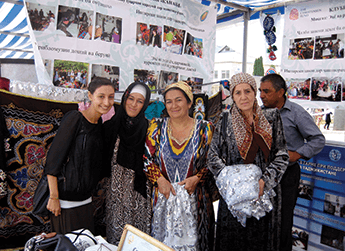
- Keratoconus, a progressive disease that involves corneal thinning and bulging, affects a significant portion of the population, particularly in patients with Down syndrome
- The disease is best treated early, but a lack of screening and awareness often prevents this
- Light for Sight’s mission is to increase keratoconus awareness among healthcare providers and ensure that children and adolescents have access to treatment
- The foundation accomplishes this goal by making connections, providing training, and seeking industry support – an ongoing task
Keratoconus, the progressive thinning and bulging of the cornea, is one of the most common causes of severe visual impairment in young people. A disorder that affects as many as one in every 1,500 people, keratoconus can lead to focusing difficulties, higher-order aberrations and corneal scarring. But it’s possible to reduce the impact of this potentially debilitating disease with proper diagnosis and early corneal collagen cross-linking (CXL) treatment to halt its progression. The best time to treat keratoconus is early in the disease, before significant changes in corneal shape and thickness take place – but to do this, we must overcome two obstacles: one, the lack of routine systematic screening for children and adolescents, and two, a lack of childhood keratoconus awareness among health care professionals.
With the knowledge that awareness presents an obstacle to early treatment, and that the Down syndrome population has a higher prevalence of keratoconus, my colleagues and I founded Light for Sight – a nonprofit organization whose mission is to combat preventable blindness among children and adolescents with keratoconus. We chose the name Light for Sight to reflect that goal – a reference to the use of ultraviolet light to perform CXL, the only surgical intervention proven to arrest progression of keratoconus. Light for Sight has been operating for over four years and has brought keratoconus awareness and treatment to both specialized patient groups and the public.

Taking treatment to Tehran
Down Syndrome International, a patient organization based in London, contacted us on behalf of one of their members. The Tajikistani family has a son with Down syndrome and suspected keratoconus. They knew that he needed ophthalmic care to preserve his already limited sight, but they had no access to a corneal specialist. Time was of the essence, and traveling would be difficult due to political conditions and visa requirements – so Light for Sight began by locating corneal surgeons near Tajikistan. The foundation ultimately contacted Hassan Hashemi, head of the Noor Eye Institute in Tehran, Iran. Hashemi recommended that the family travel to his clinic’s headquarters in Tehran, rather than one of the subsidiaries in Afghanistan, so that he could provide the best possible care. But that raised another obstacle – they had extremely limited funds for travel, lodging and treatment. When Hashemi heard this, the Noor Eye Institute didn’t stop at providing treatment; not only did the clinic still accept the patient, but it also agreed to cover all of his medical costs. After his treatment, the mother wrote, “I don't know how to thank everyone who helped. [My son] felt sick, ate poorly, and did not sleep well. Now he sleeps well, which is most important. […] He is much more responsive than before with gestures.”Despite all of the geographic, political and financial barriers, the Light for Sight ambassadors were able to step forward and support the wellbeing of patients and their families. “All of the many people who made the connections to the hospital in Iran, all of the people who donated money, an enormous thank you for helping us,” said our patient’s mother. And that’s the goal of our foundation: to provide services to those who might not otherwise have access, so that we can eliminate keratoconus as a cause of treatable vision loss. Thanks to the generosity and philanthropic spirit of our ambassadors, we were able to achieve that goal with our Tajikistani patient.
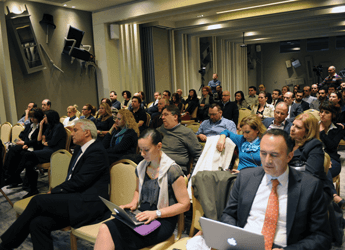
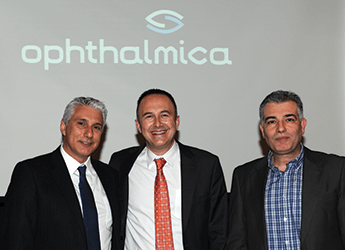
Advocating for awareness
One of the newest Light for Sight ambassador groups is also one of our most active. Led by Miltos Balidis, director of corneal and refractive services at Protipo Ophthalmiatrio in Thessaloniki, Greece, the team created a media campaign to increase the awareness of eye problems – including keratoconus – among the Down syndrome population. They strategically launched the campaign on March 21st, World Down Syndrome Day. The team contacted national television outlets and other media sources to bring more awareness to their work. They organized a mini-symposium in Thessaloniki on the launch date, inviting international corneal experts to speak on their area of expertise. The program was split into a scientific session, mainly focused on keratoconus and CXL, and an accessible session for health care providers, patients and their families. Conducted at the office of the regional Down syndrome patient organization, television and radio stations translated, recorded and broadcast the ophthalmologists’ presentations and the question-and-answer sessions. The audience consisted of Down syndrome patients and their families, vision healthcare specialists and general healthcare professionals. And the campaign didn’t stop there – the Thessaloniki-based group have now been invited to three local schools to screen children and adolescents for keratoconus.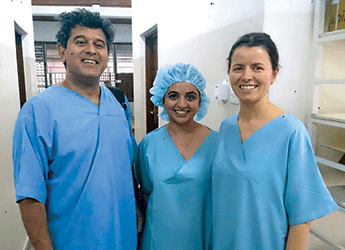
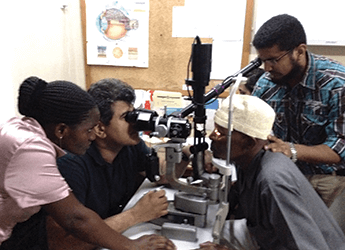
“Training the trainers” in Tanzania
Light for Sight’s mission isn’t limited to patients with Down syndrome. The foundation also works in Tanzania, where it focuses on bringing new resources to a population with limited access to specialized vision care. Sheraz Daya, the chairman and medical director of London’s Centre for Sight, initially approached Light for Sight to ask what he could do to support our international efforts. He also mentioned that he was about to leave for his annual trip to Tanzania, where he visits Comprehensive Community Based Rehabilitation in Tanzania (CCBRT) to examine and treat patients. The hospital, which initially started as a rehabilitation center for patients with cataract, is now the largest indigenous provider of disability services in the country – and we immediately saw an opportunity to bring CXL to our Tanzanian colleagues.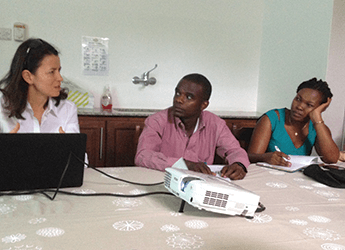
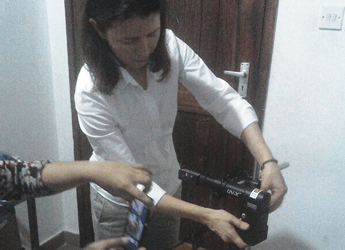
Light for Sight worked with industry partners to obtain a CXL device. Thanks to a generous donation from the (former) IROC Innocross AG, we were able to provide a lamp for CCBRT. The goal was not just to provide care – Sheraz was there to train his local colleagues on the device during his trip and then leave it with the hospital so that they could provide CXL as a part of routine patient care after his departure. During his 2013 trip to Tanzania, Sheraz was able to screen 45 cornea patients, perform nine corneal grafts, and lead a full-staff training session so that the work could continue in his absence. What did we learn from this experience? First, that training others to perform CXL, or any procedure, will have a more lasting effect than simply providing the treatment; and second, that you should never be afraid to ask for industry support for humanitarian initiatives that show promise and long-term benefits. We’re pleased with the impact that Light for Sight has had so far in raising awareness of, and bringing treatment to, keratoconus patients. But the work never ends with a mission like ours, so we hope to continue providing CXL training and treatment to ophthalmologists, patients and families for many years to come.
Nikki Hafezi is the co-founder of Light for Sight 21, managing director of GroupAdvance Consulting GmbH and the CEO of EMAGine AG, and is based in Zug, Switzerland.
